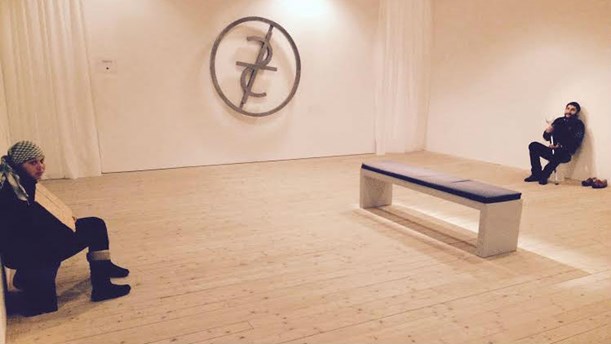Art & Exhibitions
Are Homeless People Exploited in Swedish Art Installation?


Cait Munro

An exhibition at Sweden’s Malmö Konsthall organized by the art and theater group Institutet is attracting attention for its unusual medium. Two homeless people from Romania are part of a group exhibition called “The Alien Within: A Living Laboratory of Western Society.”
Upon entering the space, which is one of the largest and most well-known exhibition halls in Malmö, visitors encounter two people sitting across the room from each other in silence, paper cups set in front of them. The pair, Luca Lacatus and Marcella Cheresi, are recent immigrants from Romania who were spotted begging on the street by the project’s organizer, Anders Carlsson.
According to the Swedish newspaper the Local, Lacatus and Cheresi are not accepting money from visitors but are being paid an hourly rate by the organizers, which comes out to about $600 for the run of the performance.
While Carlsson maintains the project is meant to spark a conversation about how to solve complicated inequalities that have led to increased poverty, homelessness, and begging in Sweden and beyond, critics have voiced concerns that Lacatus and Cheresi are being exploited and objectified.
“People want to escape the discomfort, not knowing how to relate to someone so unequal,” Carlsson told Sveriges Radio. “In a way, there’s no escape.”
Activist Ioana Cojocariu is among those who are protesting the exhibit. “I had very high expectations,” she told the Local, “but when I entered the room, it felt like an ethnological exhibition, where black bodies had been replaced by poor bodies…I think artists are well-intentioned but there have been errors.”
Lacatus and Cheresi reportedly came to Sweden after their home in Romania burned down. In the past two years, thousands of homeless people traveling from Romania have arrived in Sweden, and the Romanian government has been criticized for encouraging people to travel to Scandinavia to beg.
The show has shades of Santiago Sierra’s Veterans (2013), for which Sierra staged a performance at Team Gallery that involved a U.S. veteran facing a corner of the gallery—the subsequent show presented a series of photographs of veterans enacting a similar performance at various galleries around the world. Sierra paid them for their time, intending, according to the show’s release, to cast the veteran “as a victim of the same socioeconomic conditions that engender prostitutes, drug addicts, and illegal workers.”
When asked by the local paper Fria Tigningar (via the Local) if he felt objectified, Lacatus said, “We’ve already got used to being looked at. It is better to be here than out on the street. Here it is warm and dry anyway.” He went on to reveal that with the money they are making from the exhibition, he and his wife plan to return to Romania and “buy enough bricks to build two rooms.”
The group show also includes work by Tania Bruguera (see How Tania Bruguera’s Whisper Became the Performance Heard Round the World and Tania Bruguera’s Arrest Slows the US–Cuba Thaw).